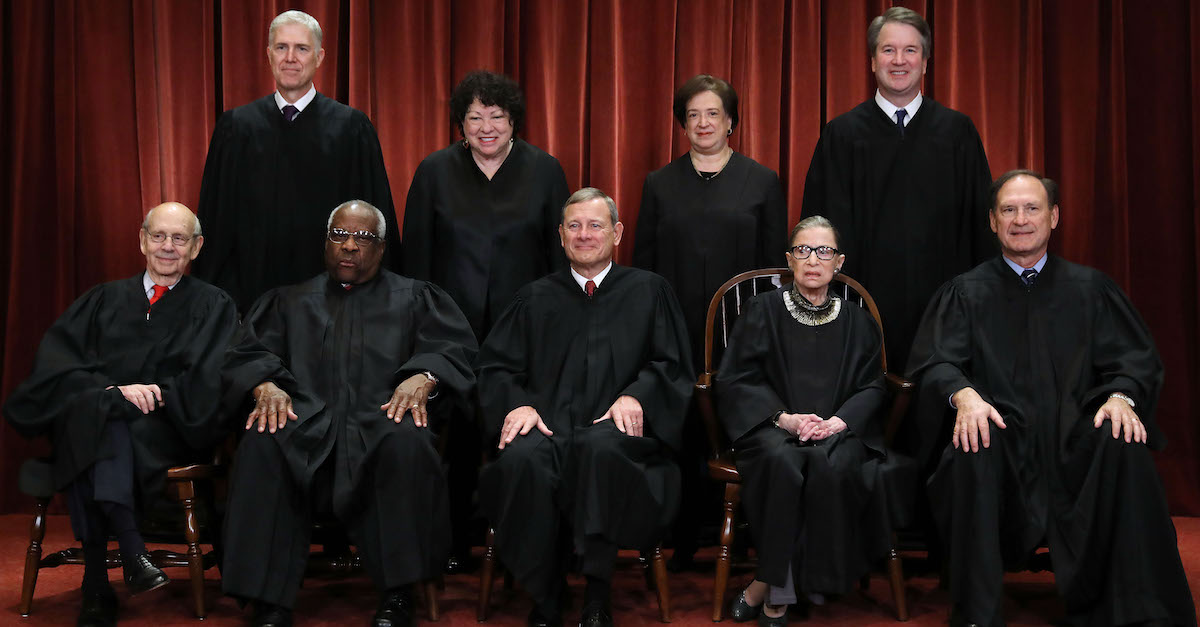
With just one opinion left to drop from the Supreme Court’s November 2019 sitting, it all but certain who will be authoring the opinion in Department of Homeland Security v. Regents of the University of California: Chief Justice John Roberts.
The #DACA case is now the only undecided case left from #SCOTUS‘s November sitting, and, after today’s decisions, the Chief Justice is the only Justice who hasn’t written at least one majority opinion from that session…
— Steve Vladeck (@steve_vladeck) April 23, 2020
Neither the high court’s ruling nor the opinion’s authorship has been officially announced, of course; for court watchers, though, this is just a numbers game.
And now that Maui is out, too (per SGB), it’s a sure thing that Roberts is (or at least was) writing the DACA majority. https://t.co/oC2JZodLfK
— Marty Lederman (@marty_lederman) April 23, 2020
SCOTUS handed down rulings on Thursday in Barton v. Barr and County of Maui v. Hawaii Wildlife Fund, authored by Justices Brett Kavanaugh and Stephen Breyer, respectively. As many have pointed out, that leaves a conspicuous absence for the chief justice with just one opinion from the November sitting remaining.
with the #SCOTUS op in Barton v. Barr, the only 2 opinions left from the Nov sitting are the #DACA case + Maui. The only 2 Justices who haven’t written in that sitting are the Chief & Breyer.
(The Chief was always likely to have the DACA op, but this = pretty good confirmation.)
— Leah Litman (@LeahLitman) April 23, 2020
Today’s Supreme Court rulings make pretty clear that Roberts is writing the DACA decision. Like the other conservatives during the argument, he seemed to back Trump’s effort to rescind program. And he downplayed the possibility that dreamers would actually be deported.
— Greg Stohr (@GregStohr) April 23, 2020
At stake in the case is the fate of then-President Barack Obama’s Deferred Action for Childhood Arrivals program (“DACA”). The program, initially intended to be a short-term solution, prioritizes congressionally appropriated deportation funds. DHS was directed to allow “certain young people” (who might have been deported) to apply for a two-year deportation deferment after they’d passed a background check.” Because of DACA, these young people would be deemed lawfully present in the United States. They could legally work, obtain health insurance, and contribute to social security.
As a follow up to his many hardline immigration campaign promises, President Donald Trump attempted to end DACA in September 2017; the Ninth Circuit upheld an injunction, however, that forced the administration to continue DACA while the litigation is fast-tracked to the Supreme Court. From a legal standpoint, the situation presents quite the riddle. Essentially, the federal government is judicially required to keep DACA in place, despite the administration’s having characterized DACA as a program that supports “the ongoing violation of federal law by more than half a million people.” Viewed through the lens of executive branch as the primary enforcer of laws, DACA’s future is fragile at best.
SCOTUS’s decision to enter the DACA fray surprised many, and the drama of oral arguments did not disappoint. Republican icon Theodore Olson, President George W. Bush’s solicitor general, argued the case to uphold DACA, while Solicitor General Noel Francisco went to bat for the Trump administration. Boldly seated next to Olson at the counsel table was 31-year-old DACA recipient Luis Cortes, a lawyer and graduate of the University of Idaho College of Law.
Argument transcripts suggested that courtroom tensions were high, which probably explains why the justices apparently couldn’t stop apologizing to each other during oral arguments. Questions from the bench tended to suggest that the court’s five conservative justices were leaning in favor of Trump’s position on dismantling DACA.
But maybe another wrinkle will be added Roberts v. Trump backstory. Referencing Trump’s public criticism of a Ninth Circuit judge in a separate immigration case, Chief Justice Roberts once schooled the president on independence of the federal judiciary:
We do not have Obama judges or Trump judges, Bush judges or Clinton judges. What we have is an extraordinary group of dedicated judges doing their level best to do equal right to those appearing before them. That independent judiciary is something we should all be thankful for.
The president and the chief justice’s relationship devolved on Twitter and then peaked during the president’s impeachment trial over which Roberts detachedly presided.
Opinions are usually handed down by the last day of the Court’s term. SCOTUS’s next opinions will be released on Monday.
My confidence level is now at 85%:
Chief Justice Roberts has Puerto Rico and DACA
Justice Ginsburg has the Title VII casesSee y’all Monday! #SCOTUS
— Anthony Michael Kreis (@AnthonyMKreis) April 23, 2020
[Photo by Chip Somodevilla/Getty Images]
Have a tip we should know? [email protected]